Understanding Google My Business & Local Search
Are Younger Consumers More Tolerant of Bad Reviews? Or Do They Just Understand Them Better?
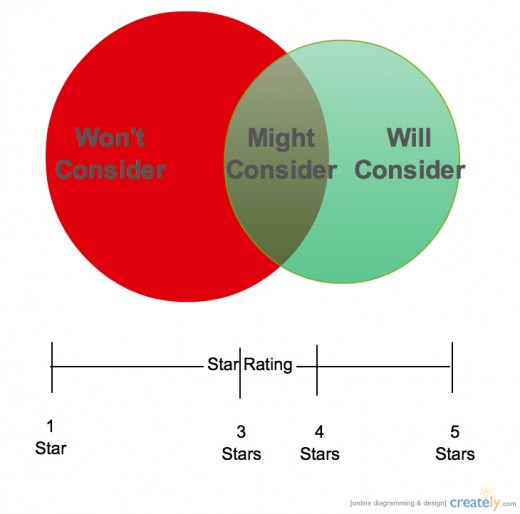
If your business has an aggregate star rating of 3 or less, you need to be concerned that shoppers might reject you out of hand. If, on the other hand you have a star rating greater than 4 most shoppers will accept you on face value. However we are seeing dramatically different standards within different age groups.
Several days ago I published surveys that clearly indicated that consumers perceive that a negative review corpus hurts a business more than positive reviews help them.

I asked the following questions:
If you found a [business] online with negative reviews from customers, how likely would you be to choose it?
If you found a [business] online with positive reviews from customers, how likely would you be to choose it?
The surveys, in asking the questions in a broad way, left the question of what negative and positive reviews meant to the survey taker.
To answer the question of exactly where a searcher drew the lines I asked these two follow up questions:
When searching online for a local business, at what point on a 5 star review scale would you decide to NOT consider the business?
When searching online for a local business, how many review stars on a 5 star scale do you need to consider the business?
Here are the overal results to the first question (sample size 2500 American internet adults ages 18 and up):
And the results to the second (sample size 2500 American internet adults ages 18 and up):
It’s a little easier to parse this data by consolidating some of the results. Essentially if a business is showing 3 stars or less, 82.8% would not do business with that business.
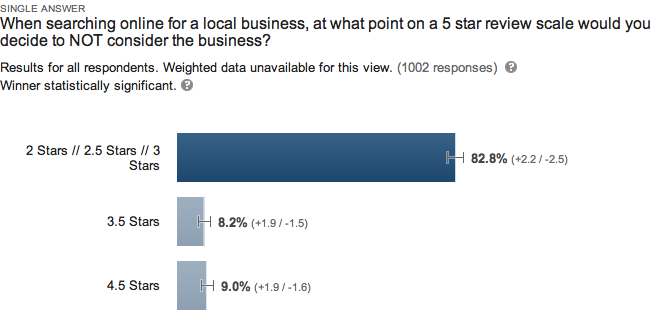
Like wise, about the same percentage, ~84.5% would need to see something greater than 4 stars before considering any given business.
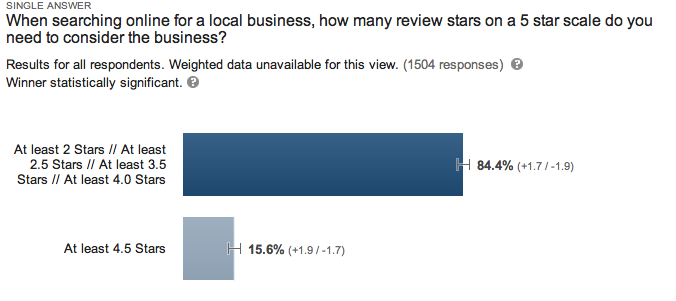
And ~50% would need to see something greater than 3.5 stars to make the positive decision.
The obvious conclusion from this, in a general sense, is that if a business has a star rating greater than 3 than they will not be rejected out of hand and if they have star rating greater than 4 then most folks would consider that business favorably.
That make all kinds of sense but the research really turned up some interesting results when you started looking at the data by age group.
18-24 year olds were much more likely to set a much lower barrier when rejecting a business for having bad reviews. In other words they were much more tolerant of businesses with ratings in the 2.5 – 3.0 star range than were older searchers.
Likewise, those over 55 are much more likely to require a 4 or higher star rating to even think about a business. It was amazing to me to see the direct correlation between age and the need to see a higher star rating.
This may be due to what Dan Leibson noted in the comments of the previous survey about how he uses negative reviews. Younger, more review savvy searchers might consider themselves better able to ascertain the nuances of a lower review through practice and familiarity with reviews. They actually search out the negative reviews to see if there is a deal stopper.
Also the 5 Star system is not very nuanced and often, particularly in food, does not capture the essence of a place… the food might be great but the decor is atrocious… are they still a 5 star? I know that I am a sucker for a down home diner where the waitresses call me hon and are not afraid to brandish their tattoos. These subtleties might be lost in a 5 star rating and I am more than willing to look a little down the rating scale if there is a diamond in the rough.
Likewise those that are older might have decided that life isn’t long enough to have to work to figure out the answer to a simple question like where should I eat tonight. It is possible that they relate to review stars they way that they have related to hotel stars as some form of objective approval of an establishment. By taking that approach they are less needful of going in and parsing the negative reviews.
Those questions as to why there is such a divergence in approach to reviews by age will need to remain speculation for now. Suffice it to say that if you are dealing with a younger audience you can worry less about perfection in your star ratings.
The full survey results are available for members of the LocalU forums here.
(Disclaimer: I have always had a strong interest and appreciation for reviews. I finally did something about that and founded a review & feedback management product with Don Campbell called GetFiveStars.com. So be forewarned that I have a commercial interest that may bias my opinions in this matter. )
© Copyright 2025 - MIKE BLUMENTHAL, ALL RIGHT RESERVED.
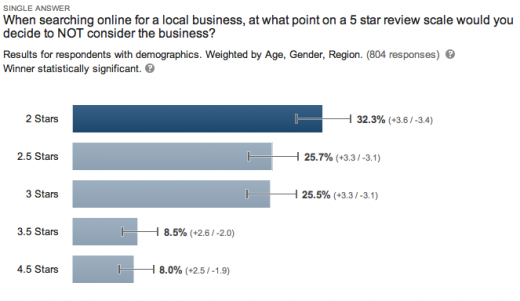
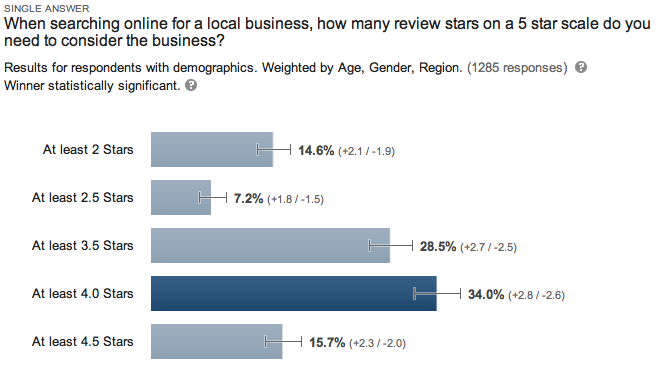
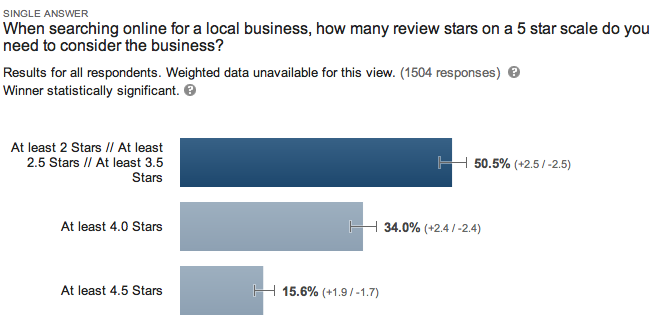
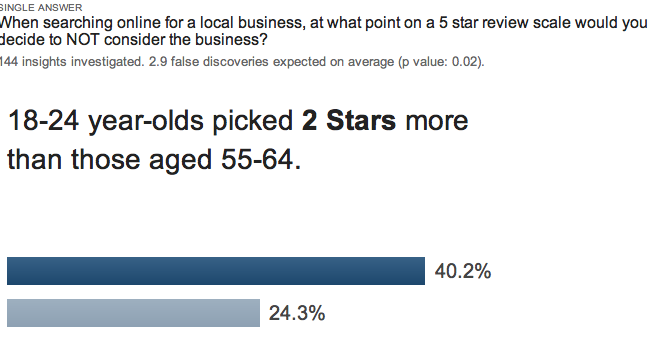
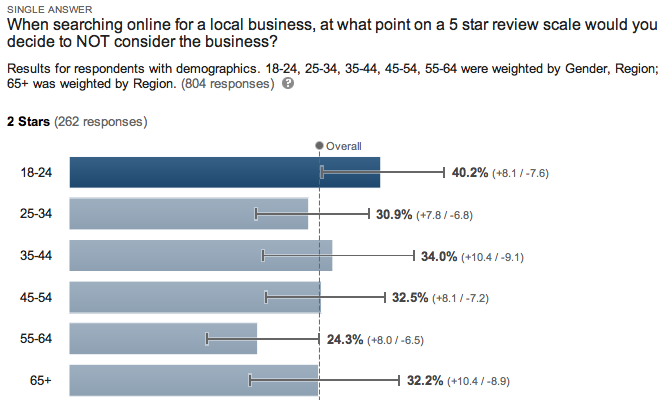
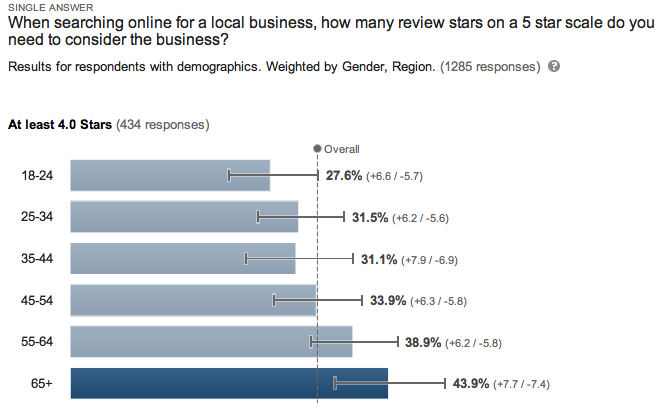
Comments
4 Comments
Hi Mike,
I have a client that freaks out every time they get less than a 5 (on a 1-5 scale) review. I don’t think the occasional “lower” score is a problem.
I think in reality, who a consumer chooses has as much to do with what the competitors scores are that they see. If you are an average 3.5, and you have 3 other competitors on the same page with 4.7 average, your not going to be in the running
I want to mention I am using getfivestar.com for 4 or 5 clients. Excellent service Mike! (I am in no way compensated for that endorsement)
@Mike
My follow up post will hopefully detail the situations in which negative reviews are a positive and there are a number.
There is certainly a big difference though between having several bad reviews and having an average rating of 2.5.
Thanks for the nod on GetFiveStars.
@Mike, was there any conditional statement to understand what ratio of searchers always/sometimes/never look for a companies reviews? The question I would like to understand is what ratio of searchers does the above data apply to?
@Jeremy
Previous research puts that number somewhere between 30% and 50% of the searchers.
http://www.mosesandrooth.com/Articles/Google-Survey.shtml
http://localu.org/blog/how-do-consumers-find-a-b-b/
Seems to be very dependent on vertical. It might be higher than I measured in others
Comments for this post are closed.